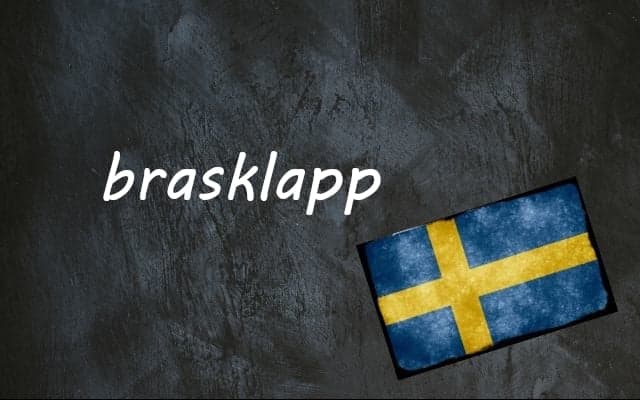Swedish word of the day: brasklapp

This word tells the story of one of the bloodiest massacres in Swedish history.
The word brasklapp (brask-lapp) is fairly straightforward to translate into English (or Latin if you want to be that kind of person today): it’s the Swedish word for caveat, a warning that what you’re about to say may not be completely accurate or may have certain limitations.
But it has a far more interesting history.
Brasklapp dates back to a series of events that led to mass executions in the main square of Stockholm’s Old Town in 1520, a massacre known as “The Stockholm Bloodbath”.
The Bloodbath came about after King Christian II of Denmark (known as Christian the Tyrant in Sweden) seized the city and at the urging of Archbishop Gustav Trolle ordered the execution of up to 100 people on November 7th-9th, in revenge for scheming against Trolle in a conflict between two political factions a few years earlier. The official charge was heresy, because, you know, 16th century and all that.
Brought forward as part of the evidence were signatures from a meeting in Arboga in 1517 which sided with Trolle’s rival Sten Sture. The bishop of the town of Linköping at the time, Hans Brask, was among the people who had signed the document, but here’s the twist:
The legend (although its veracity is debatable) tells that Brask had hidden a note, a caveat if you will, underneath his wax seal, saying “to this I am forced and compelled” – that is, that he was forced to take part in but did not support the decision to remove Trolle from office.
Brask’s life was spared, and his legacy became the brasklapp – “a brask note”.
Examples:
Fotbollsmatchen spelas på söndag, med brasklappen att det beror på vädret
The football match will be played on Sunday, but it depends on the weather
Bara en brasklapp: Historien om Hans Brask är kanske inte helt sann
Just one caveat: The story of Hans Brask may not be entirely true
Villa, Volvo, Vovve: The Local’s Word Guide to Swedish Life, written by The Local’s journalists, is now available to order. Head to lysforlag.com/vvv to read more about it. It is also possible to buy your copy from Amazon US, Amazon UK, Bokus or Adlibris.
Comments (1)
See Also
The word brasklapp (brask-lapp) is fairly straightforward to translate into English (or Latin if you want to be that kind of person today): it’s the Swedish word for caveat, a warning that what you’re about to say may not be completely accurate or may have certain limitations.
But it has a far more interesting history.
Brasklapp dates back to a series of events that led to mass executions in the main square of Stockholm’s Old Town in 1520, a massacre known as “The Stockholm Bloodbath”.
The Bloodbath came about after King Christian II of Denmark (known as Christian the Tyrant in Sweden) seized the city and at the urging of Archbishop Gustav Trolle ordered the execution of up to 100 people on November 7th-9th, in revenge for scheming against Trolle in a conflict between two political factions a few years earlier. The official charge was heresy, because, you know, 16th century and all that.
Brought forward as part of the evidence were signatures from a meeting in Arboga in 1517 which sided with Trolle’s rival Sten Sture. The bishop of the town of Linköping at the time, Hans Brask, was among the people who had signed the document, but here’s the twist:
The legend (although its veracity is debatable) tells that Brask had hidden a note, a caveat if you will, underneath his wax seal, saying “to this I am forced and compelled” – that is, that he was forced to take part in but did not support the decision to remove Trolle from office.
Brask’s life was spared, and his legacy became the brasklapp – “a brask note”.
Examples:
Fotbollsmatchen spelas på söndag, med brasklappen att det beror på vädret
The football match will be played on Sunday, but it depends on the weather
Bara en brasklapp: Historien om Hans Brask är kanske inte helt sann
Just one caveat: The story of Hans Brask may not be entirely true
Villa, Volvo, Vovve: The Local’s Word Guide to Swedish Life, written by The Local’s journalists, is now available to order. Head to lysforlag.com/vvv to read more about it. It is also possible to buy your copy from Amazon US, Amazon UK, Bokus or Adlibris.
Join the conversation in our comments section below. Share your own views and experience and if you have a question or suggestion for our journalists then email us at [email protected].
Please keep comments civil, constructive and on topic – and make sure to read our terms of use before getting involved.
Please log in here to leave a comment.